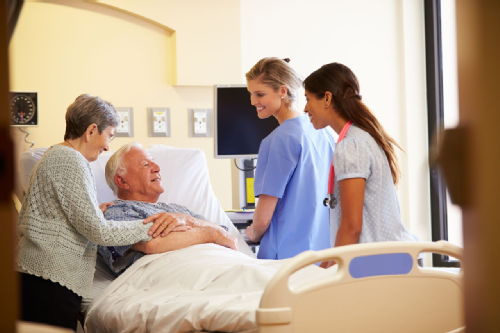All 4 entries tagged Patients
View all 59 entries tagged Patients on Warwick Blogs | View entries tagged Patients at Technorati | There are no images tagged Patients on this blog
November 18, 2014
A day in the life of a GP!
A few weeks ago I spent a day shadowing various healthcare professionals at a GP surgery. The majority of my GP experience comes from my own visits so I was looking forward to seeing what really goes on, and getting to spend time with other members of the team.
During the day I spent time at reception, with the nurse, in the dispensary department, going on home visits and sitting in with the GP for their afternoon clinic. Getting to experience so many different aspects of the practice was so interesting, and enabled me to see a wide range of patients.
In reception you would have the regular patients who loved to have a quick catch up, the patients who didn’t have time to wait for the receptionist to answer their questions, and then everyone in between. As the morning got underway the surgery got busier and busier – the phone rang incessantly and more people had follow-up appointments to book. I got to see how the electronic system worked and how every clinic was coded and ordered.

When I spent time with the nurse I mainly saw a variety of injections – whether it was for a new-born, contraceptive needs or elderly vaccinations. The nurse was great at communicating with patients of all ages – and I got to see how best to deal with a screaming infant who did not want their MMR jab, even with the bribery of stickers and sweets!
The dispensing part of the surgery was really fascinating. My GP at home doesn’t have one so it was great to learn how they work, and which patients are eligible to use them. It was also interesting to see all the different ways prescriptions can be ordered – email, phone, paper... And then just how real polypharmacy is – some patients would have boxes and boxes of tablets. The pharmacist highlighted how it is just as important for them to check the different medications as the doctor, sometimes they can suggest a better alternative or a possible reduction when they are going through a prescription.
Having the opportunity to go on a couple of home visits was great. Neither of the patients really needed to see the doctor for anything important, they were both more of just a chat, but it showed how elderly patients in particular appreciate seeing a figure they trust and can open up to. Conversely, it also showed how sometimes such patients can take up a lot of time, and increase the pressures put on GP’s schedules.
Finally, sitting in on the afternoon clinic! I loved seeing again the real mix of patients that attended. Sometimes the doctor could guess what the presenting complaint was going to be, but other times it was completely random. It also gave me the chance to see what questions I would ask, or what areas I would examine and how that differed to what was actually done. I learnt a great deal and went home with a list of things to look up!
All in all I really enjoyed my day and am looking forward to my GP placement later on. I liked it a lot more than I was expecting, and therefore it made me re-think my preconceptions for various other specialities.
March 31, 2014
In the deep end
My first week on my Orthopaedic and Anaesthetic block was dedicated entirely to Anaesthetics. For anyone who doesn’t know, an anaesthetist is a doctor whose responsibility it is to ensure a patient is asleep and comfortable during an operation. The majority of an anaesthetist’s clinical commitment is spent in theatre.

Our first proper day with our consultant was on a Tuesday. Our instructions were to meet him on the pre-op ward for the Obstetrics and Gynaecology list. Simple enough instructions, but it took us a good deal of walking around the hospital to find the right ward and by the time we had got there the anaesthetist had already seen the first patient. No worries though as he seemed to sympathise and we quickly found ourselves observing him performing a pre-operative assessment on a patient. After watching him assess the patient he turned to us and said “Okay, so now you have seen one you can do the other two between yourselves. I will see you in theatre.” I laughed, but before I had realised it wasn’t a joke, he had already left the ward.
This is what it has felt like since starting on rotation, as though you are in the deep end, and I love it! Whilst it is incredibly daunting, I wouldn’t have it any other way. I hate standing around watching people talk and do things; I much prefer to be doing it myself. Unfortunately, what I also hate is doing things wrong, and I seem to have been doing a lot of that lately, but I guess that is part of the learning process.
Fast forward two less than ideal anaesthetic pre-assessments later and we find ourselves heading to theatre. We walk into the reception area and without even opening our mouths we are greeted with “Are you medical students?” Now, yes, we are medical students but I am amazed how many people know this without me even saying it. Patients aren’t so good at telling, but hospital staff seem to be experts at knowing, it’s almost second nature. It keeps happening. How, how on earth does almost every hospital employee know we are students? Either there is a big sign over my head that I can’t see, or I don’t have as good a poker face as I’d like to think and I constantly look how I feel – a mix between a deer stuck in headlights and child in a sweet shop! Unfortunately, I think it’s the latter.
On this occasion however I am glad we were noticed as fresh-faced medical students because the first time you turn up to theatre is quite intimidating. Much like everyone who realises we are medical students, the operating theatre manager was very good in showing us where the changing rooms and operating theatres were and letting us know what to do. It is really nice how helpful people have been to us.
When you go into an operating theatre you have to wear scrubs, and if anyone hasn’t told you, they are one of the most comfortable things in the world to wear. I think a lot of anaesthetists love their job because essentially they wear pyjamas for the most of the day.

Now I’m pretty sure I’m not alone in thinking this, one of the biggest challenges of any surgical or anaesthetic rotation is finding clogs that match! Clogs are the shoes that you have to wear in an operating theatre. When you arrive in the changing room you are greeted by a box of clogs which look as though they have been filed away using the same system a toddler uses to put their toys in a toy box. It is chaos. If you are contentious enough (like you will be in your first week at least) you will spend at least five minutes searching for a pair of clogs that are the right size, the same colour and the same design. Basically a matching pair, but I am pretty certain there are no matching pairs in these boxes.
I have rambled on a bit about things that are quite non-medical in this post. Next time my post will be more medically focused. A lot of time and energy does need to be spent on learning where places are, different etiquettes in different areas and how to get the most out of our time. Now that’s out the way, I feel I can focus purely on Medicine; let the fun and games really begin!
Amrit :-)
March 27, 2014
Meeting Patients (Part 2)
In my last blog I told you a bit about how much fun I was having speak to, and examining patients on the ward. I also wrote about how good my clinical tutor is and how nice he had been to us.
This week, while we were making our way round the wards, all together for the last time, a junior doctor stopped my clinical tutor to tell him that there was a lady on the ward with a really interesting heart murmur and that he should take us to go an have a listen. The junior doctor also wasn't quite sure what the murmur was so wanted our clinical tutor to confirm the diagnosis. Anyway, my tutor approached the patient and asked her if it would be OK for us to have a listen to her heart. Since he had recently explained heart sounds to me for the 16th time this term, he said I should listen because he was sure I'd get it.

I approached the patient and asked politely if I could have a listen to her heart and would she mind if I reached through her nightwear to do so. I think for a first year, this bit is always so embarrassing, even though there really isn't anything to be embarrassed about. I noticed she didn't have any underwear on, so asked if it was OK to just place my stethoscope under her breast. Of course she said it was fine, not giving it a second thought while I stood there awkwardly trying to co-ordinate lifting, whilst trying to put my stethoscope in place, whilst going slightly red and causing a fuss over nothing.
I managed to maintain some of the patient’s dignity when the junior doctor came in and said that this was not the patient that we were meant to be listening to, and it was in fact the patient in the bed opposite. My clinical tutor just made me stop what I was doing and I sheepishly apologised to the patient for the trauma she'd just experienced - (don't worry, she actually wasn't harmed during the process of my poor cardiovascular examination). We tottered off to the other patients’ bed quickly before the whole room noticed- the curtains are soundproofed too, right? I made sure I didn't go first this time, but on the plus side I did manage to get it right for a change. I blame my clinical tutor :-)

We're fast approaching the Easter break now which means one thing...... exams are just around the corner. Panic is setting in all around. It seems so ridiculous, being nervous about exams when there is still quite a long period of time between now and then, but here we are, five months into our medical degrees and it has flown by!
We have five blocks of learning in our first year, and at the end of each block we have a formative assessment, to help us identify how we have got on with the block and hopefully point us in the direction of what we need to revisit before the summative at the end of year. Unfortunately, every time I do a formative, it just seems to highlight that I need to revisit absolutely everything and makes me feel a bit more nervous about the summer. Anyway, we have five nice, long, revision filled weeks to buckle down before the last block. I'll have to make sure I have time to enjoy at least one Easter egg though.
See you soon
Amy
February 12, 2014
Meeting patients
OSCE is done and I'm happy to say it went quite well (I won't get ahead of myself too much yet). I managed to enjoy it even though there were a few hairy moments, so I'm definitely feeling a bit better about the real thing in the summer. Recently we've started seeing real patients in the hospital. So far all of the patients I have met have been so nice, and really keen to help us out, and it feels good to strut around the hospital with your stethoscope around your neck pretending that you know exactly what you're doing. After all, you've got to fake it until you make it, right?

I saw a really nice man last week that came in with shortness of breath. He was happy to have a chat with us and even talked me through my respiratory examination - "I think you're supposed to have a listen now, on both sides of my chest and my back" - at least one of us knew what we were doing. I suppose it's a bit like learning to ride a bike. In the first week we had our clinical tutor guiding us through the history, helping us to ask the right questions, a bit like having stabilisers on. Now we've had them taken off but we're wobbling a bit, still asking what we should do next and how we might make things better in the future. Before we know it we'll be flying solo, bothering patients all on our own.
I really like my tutor and I learn a lot from him. I've also found that a lot of the theory makes much more sense when put into real life, clinical context. Every week though my tutor says "I'll show you this now and you'll never forget". Thankfully, he hasn't remembered that he has had to show me the exact same thing three weeks in a row. He recently tricked us by instructing us to take a history from a man who was completely aphasic and a woman who didn't speak any English at all. I suppose it's all part of the learning curve!
It is quite uplifting meeting people who think that you're an important person and are absolutely entitled to know their deepest, darkest secrets. I'm amazed at how forthcoming patients have been with letting us talk to them, prod them and poke them, even though they have gone through the motions countless times before. People are generous and encouraging. The whole experience definitely fills me with optimism for the future, however naive that may be. I like the idea that one day I can do something to help the people who have helped me to learn. Hopefully though they won't remember that one medical student who palpated them a bit too aggressively or made them sit for ages in the cold without a top on. I hope it has been as positive an experience for them as it has been for me. It can only get better with practice.
See you soon,
Amy
 Megan Earle
Megan Earle

 Please wait - comments are loading
Please wait - comments are loading
 Loading…
Loading…